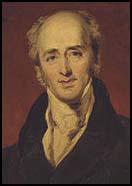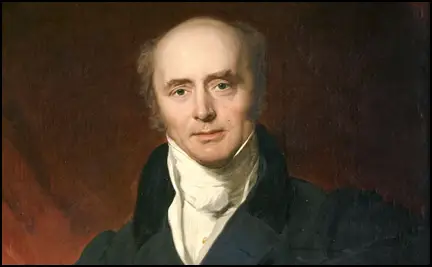Earl Grey

Charles Grey was born at Fallodon on 13th March 1764. His father, General Charles Grey, was one of Britain most important military commanders. He was later granted the titles Viscount Howick and Earl Grey. After being educated at Winchester and King's College, Cambridge, Charles Grey toured Europe.
At the age of twenty-two Charles Grey he became the Member of Parliament for Northumberland. Although his father was a staunch Tory, Grey soon became a follower of Charles Fox, the leader of the Radical Whigs in the House of Commons. Like Fox, Grey disliked William Pitt and was a consistent critic of the British Prime Minister.
Grey did not agree with those who advocated universal suffrage but he did feel that there was a strong need to improve the parliamentary system in Britain. In April 1792, Grey joined with a group of pro-reform Whigs to form the Friends of the People. Three peers (Lord Porchester, Lord Lauderdale and Lord Buchan) and twenty-eight Whig MPs joined the group. Other leading members included Richard Sheridan, Major John Cartwright, Lord John Russell, George Tierney,Thomas Erskine and Samuel Whitbread. The main objective of the the society was to obtain "a more equal representation of the people in Parliament" and "to secure to the people a more frequent exercise of their right of electing their representatives". Charles Fox was opposed to the formation of this group as he feared it would lead to a split the Whig Party.
On 30th April 1792, Charles Grey introduced a petition in favour of constitutional reform. He argued that the reform of the parliamentary system would remove public complaints and "restore the tranquillity of the nation". He also stressed that the Friends of the People would not become involved in any activities that would "promote public disturbances". Although Charles Fox had refused to join the Friends of the People, in the debate that followed, he supported Grey's proposals. When the vote was taken, Grey's proposals were defeated by 256 to 91 votes.
On 6th May 1793, Charles Grey once again introduced a parliamentary reform bill. Grey argued that one of the basic principles established by the Glorious Revolution of 1688 was the freedom of elections to the House of Commons. Grey added that "a man ought not to be governed by laws, in the framing of which he had not a voice, either in person or by his representative, and that he ought not to be made to pay any tax to which he should not have consented in the same way." Grey also attacked William Pitt, the Prime Minister, for the way that he exploited the present system. Grey pointed out that Pitt had created 30 new peers who nominated or indirectly influenced the return of a total of 40 MPs.

Charles Fox and Richard Sheridan supported Grey in the debate that followed. Robert Jenkinson and Lord Mornington, spoke against. So also did William Pitt who argued that any reform at this time would give encouragement to the Radicals in Britain who were supporting the French Revolution. When the vote was taken, Grey's proposals were defeated by 282 to 41. Members of the Friends of the People now realised they had no chance of persuading the House of Commons to accept parliamentary reform and the group disbanded.
In 1794 Charles Grey spoke against the suspension of the Habeas Corpus Act and the following year he opposed the Seditious Meetings Bill. Frustrated by Pitt's refusal to consider parliamentary reform, Charles Grey decided to stop attending debates at the House of Commons. After a three year absence Grey returned in 1800 to oppose the Act of Union with Ireland.
In April 1803 Henry Addington offered Grey a place in his coalition government he refused with the comment that he would not take office without Charles Fox. When Fox entered the cabinet in January 1806, Grey joined him as first Lord of the Admiralty.
After the death of Charles Fox on 13th September, 1806, Charles Grey became leader of the Whig section of the government. Grey now became Foreign Secretary and leader of the House of Commons and was responsible for the act abolishing the African Slave Trade. In March 1807 George III ordered Lord Grenville's government not to introduce any more controversial measures. Grenville's government believed this instruction was unconstitutional and they resigned.
Charles Grey's father died on 16th November 1807. He now inherited his father's title and moved to the House of Lords. Although he was no longer in the House of Commons Earl Grey continued to play an active role in politics. He took part in the campaign for Catholic Emancipation and changes in the parliamentary system but was unsuccessful in persuading Lord Liverpool and his Tory government to introduce reforms. Grey opposed the renewal of war with France in 1815 and denounced the Gagging Acts imposed in 1817.
In June 1830 Earl Grey made an impressive speech on the need for parliamentary reform. The Duke of Wellington, the prime minister and leader of the Tories in Parliament, replied that the "existing system of representation was as near perfection as possible". It was now clear that the Tories would be unwilling to change the electoral system and that if people wanted reform they had to give their support to the Whigs.
On 15th November, 1830 Wellington's government was defeated in a vote in the House of Commons. The new king, William IV, was more sympathetic to reform than his predecessor and decided to ask Earl Grey to form a government. As soon as Grey became prime minister he formed a cabinet committee to produce a plan for parliamentary reform. Details of the proposals were announced on 3rd February 1831. The bill was passed by the House of Commons by a majority of 136, but despite a powerful speech by Earl Grey, the bill was defeated in the House of Lords by forty-one.
The defeat of the Reform Act resulted in Earl Grey calling a general election. The Whigs were popular with the electorate and after the election they had a larger majority than before in the House of Commons. A second reform bill was also defeated in the House of Lords. When people heard the news, riots took place in several British towns. Nottingham Castle was burnt down and in Bristol the Mansion House was set on fire.
In 1832 Earl Grey tried again but the House of Lords refused to pass the bill. Grey now appealed to William IV for help. He agreed to Grey's request to create a large number of new Whig peers. When the Lords heard the news, they agreed to pass the Reform Act. On 7th June the Bill received the Royal Assent and large crowds celebrated in the streets of Britain.
Earl Grey now called another general election and in the new reformed House of Commons, Grey had a majority of over a hundred. The Whigs were now able to introduce and pass a series of reforming measures. This included an act for the abolition of slavery in the colonies and the 1833 Factory Act. After the passing of the 1834 Poor Law Earl Grey decided to resign from office.
Earl Charles Grey died on 17th July, 1845.
Primary Sources
(1) James Grant, Random Collections of the House of Lords (1836)
The name of Earl Grey is one which is, without question, destined to be better known by posterity than of any other statesman of the present day. The zeal and energy with which, in early life, he expoused those liberal principles of Reform which he afterwards not only lived to see triumphant, but whose triumph was chiefly brought about by his own instrumentality. He was the author of that great measure, and the Minister under whose auspices it was triumphantly carried through both Houses of Parliament, in defiance of a most decided and powerful opposition, that gives him that commanding station which he now occupies in the eyes of the country, and which his memory will inevitably occupy in the eyes of future ages.
(2) Mrs Arbuthnot's Journal (29th November, 1830)
I earnestly hope this government will not last and I don't expect it, for they are a most heterogeneous mass of persons taken from all parties and have made some most extraordinary appointments. Lord Grey has given good places to his son, his three sons-in-law, three brothers-in-law, besides nephews; has made two merchants, one Secretary to the Treasury and the other Vice-President of the Board of Trade. This is all quite new. No merchants were ever before put into financial situations, and certainly the Duke of Wellington did not crowd the offices with his sons and nephews.
(3) Lord Hatherton, E. J. Littleton, Chief Secretary for Ireland under Earl Grey, diary entry on the death of Earl Grey.
Lord Grey's death has long been expected - he was 82 - the uncompromising friend of Fox in the height of revolutionary madness in France. He gradually mellowed down into Conservative Whiggism, as years and experience advanced: and died as much a Conservative as Peel himself.
Lord Grey's carriage was aristocratic and lofty in the extreme. It was a fine thing to see him in his erect stature and graceful figure - and bald elevated forehead - on the floor of the House of Lords, delivering one of his great orations, which were always vigorously conceived, lucidly arranged, and given in fine classical language. He was generally in evening dress - black pantaloons (tight) and a white waistcoat, with Blue Ribbon and Garter.

